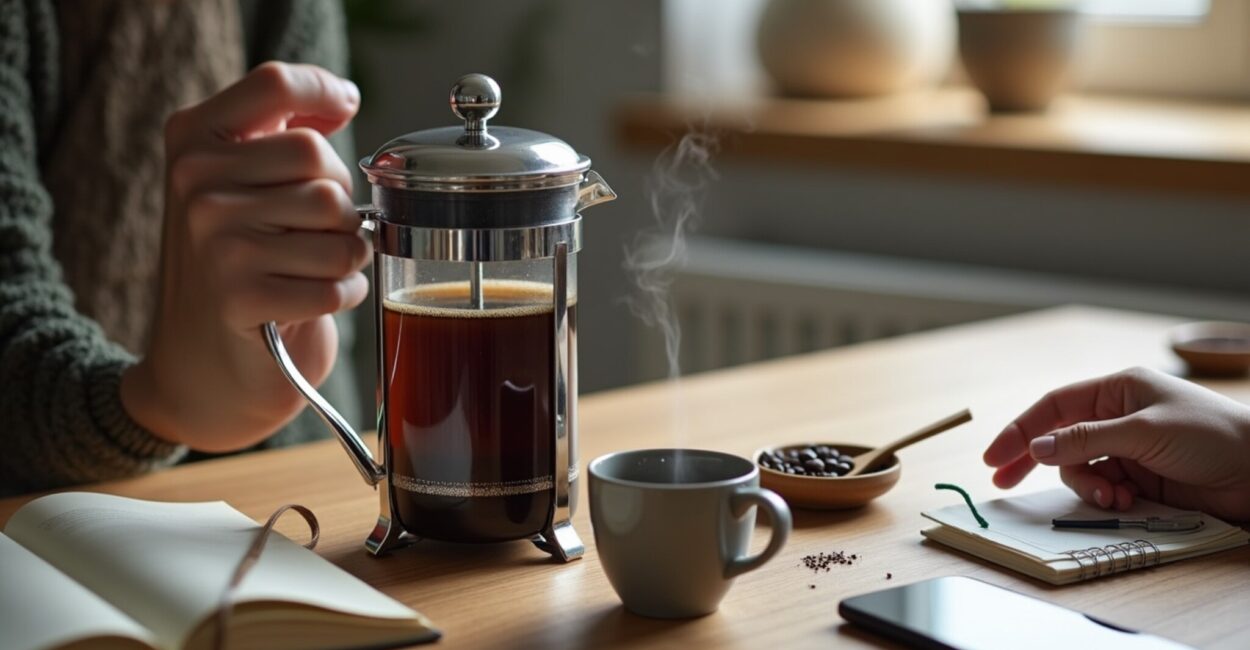Warning: Cannot modify header information - headers already sent in /home/u278635817/domains/mymorninglife.com/public_html/wp-content/plugins/artigosgpt/artigosgpt.php on line 29509
Warning: Cannot modify header information - headers already sent in /home/u278635817/domains/mymorninglife.com/public_html/wp-content/plugins/artigosgpt/artigosgpt.php on line 29509
What are morning coffee rituals for daily energy, why do they matter, and how can a few simple habits reshape your focus and mood each day? This article explains the concept, shows why consistency matters, and maps practical rituals you can adopt immediately.
In a world where mornings set the tone, a mindful routine that blends coffee, movement, and short rituals turbocharges productivity and mood. You’ll learn quick methods—French press pour-over, 10-minute meditation, breathwork—that improve alertness, reduce stress, and sustain energy.
Read on to discover a mobile-friendly, science-backed blueprint for reliable daily energy, with step-by-step actions, a useful table, and expert links to support your new routine.
Contents
ToggleDesigning Your Ideal Morning Coffee Ritual
Start with intention: choose a simple ritual that pairs brewing technique with mindful action to amplify focus and resilience. The ritual should be repeatable, pleasant, and suited to your schedule.
Choose the right brew
Experiment with grind size, brew time, and water temperature to control flavor and caffeine release. A French press produces a fuller body, while a pour-over highlights clarity.
Set a calm environment
Dim harsh lights, play soft sounds, and dedicate a small counter space to the ritual. A peaceful setting enhances enjoyment and trains your brain to switch into focus mode.
Pair with intention
Combine the coffee ritual with a short mantra or goal-setting habit. This anchors motivation and transforms a simple beverage into a performance trigger.
Quick Rituals to Boost Focus and Energy
Small practices embedded into the coffee routine deliver outsized benefits for attention and mood. Pick rituals that fit 5–15 minutes without adding friction.
10-minute meditation
Close your eyes, follow the breath, and observe thoughts without judgment. Short meditations sharpen attention and reduce mental chatter for the morning ahead.
Breathwork sequences
Alternate nostril or box breathing calms the nervous system and improves oxygen flow. These techniques support sustained alertness and emotional balance.
Light movement
Simple stretches or a brief walk increase blood flow and wake the body. Movement synergizes with caffeine for clearer thinking and steadier energy.
How Brewing Methods Affect Energy
Brewing style influences flavor, caffeine extraction, and ritual pace. A deliberate brew can lengthen the pause between waking and work, improving readiness and productivity.
French press characteristics
A French press releases oils and fuller flavors, offering a satisfying mouthfeel. The method encourages a slower ritual and mindful sipping.
Pour-over precision
Pour-over techniques emphasize control—water temperature and pour rate—yielding clarity and a meditative pace during preparation.
Quick espresso or drip
Espresso delivers concentrated caffeine fast, while drip machines offer convenience. Match your method to time constraints and desired experience.
Nutrition and Timing to Sustain Energy
Pair coffee with light nutrition and smart timing to avoid crashes. The right food choices and caffeine timing preserve steady concentration through the morning.
Light protein and healthy fats
A small serving of protein or nut butter stabilizes blood glucose and keeps energy levels even. Avoid heavy carbs that spike then drop energy quickly.
Timing caffeine intake
Consume coffee after waking stress settles—usually 30–60 minutes—to sync with cortisol rhythms. This maximizes alertness without disturbing natural hormones.
Hydration matters
Start with water before coffee to rehydrate overnight. Proper hydration prevents headaches and supports cognitive performance when caffeine kicks in.
Creating a Sustainable Morning Routine
Consistency beats intensity. Build rituals that are enjoyable and feasible five days a week, not reserved for perfect mornings. Small wins compound into resilient habits.
Start with one change
Add a single micro-habit—like a two-minute sit with your cup—and keep it for two weeks. Gradual changes embed more deeply than overwhelming overhauls.
Track effects
Note energy, focus, and mood for a week. Simple tracking reveals what rituals actually move the needle and which ones are performative.
Adjust and personalize
Tweak coffee strength, ritual length, and food choices based on sleep, workload, and season. Personalization sustains long-term adherence.
Sample Morning Routine (Step-by-step)
Follow a concise, replicable routine that fuses coffee, movement, and mindfulness for reliable daily energy.
- Hydrate immediately with a glass of water to rehydrate after sleep.
- Prepare coffee deliberately (French press or pour-over) to slow morning pacing.
- While brewing, do 5 minutes of breathwork to center attention.
- Enjoy your first sips sitting, set a single intention for the day.
- Eat a small protein-rich bite within 30 minutes of your coffee.
- Take a brisk 5-minute walk to complete the transition into work.
Tools, Timers, and Tracking for Better Rituals
Use simple tools—scale, timer, kettle—and a habit tracker to make the ritual repeatable and measurable. Small tech additions increase consistency and joy.
Essential tools
A burr grinder, kettle with temperature control, and a reliable scale standardize your coffee and improve results daily.
Use timers
Timers prevent over-extraction and keep meditations concise. A single app or physical timer maintains discipline without complexity.
Track habits
Record time, mood, and focus in an app or journal. Consistent notes reveal patterns and guide improvements over weeks.
| Ritual | Time | Benefit |
|---|---|---|
| French press + 5-min meditation | 15–20 min | Deep focus, calm start |
| Pour-over + breathwork | 10–15 min | Clear thinking, intentional pace |
| Espresso + quick walk | 8–12 min | Fast alertness, physical activation |
Conclusion
Your morning coffee rituals for daily energy are less about the perfect cup and more about the intentional pause that prepares your mind. A few minutes of mindful brewing, paired with breathwork, light movement, and gentle nutrition, can transform scattered mornings into focused momentum.
Return to the opening promise: with consistent, personalized rituals you’ll unlock steadier energy and greater clarity. Start small, measure effects, and let your ritual evolve into a reliable anchor for each day.
FAQ
How soon after waking should I drink coffee for optimal energy?
For many people, waiting 30–60 minutes after waking aligns caffeine intake with natural cortisol rhythms, avoiding a clash that blunts caffeine’s effect. This window reduces the chance of building tolerance quickly and allows your body to complete early morning hormone peaks. If you wake groggy, try a short walk or hydration first, then your coffee ritual to maximize sustained alertness and performance throughout the morning.
Can a 10-minute meditation really improve my focus with coffee?
Yes. Short meditations increase attentional control and reduce rumination, which complements caffeine’s alerting effects. Ten minutes trains the mind to settle quickly, so when caffeine raises arousal your focus is channeled rather than scattered. Pairing meditation with the ritual of brewing reinforces consistency and creates a neurochemical context that supports productivity and calmer stress responses.
Which brewing method is best for lasting energy: French press, pour-over, or espresso?
There’s no single “best” method; each has strengths. French press offers fuller flavor and a slower pace ideal for mindfulness. Pour-over provides clarity and ritualized control, supporting deliberate mornings. Espresso gives quick, intense stimulation for busy schedules. Choose based on desired ritual length, flavor preference, and how your body responds to caffeine for steady energy.
What should I eat with my morning coffee to avoid an energy crash?
Combine coffee with light protein and healthy fats—Greek yogurt, nuts, or an egg—to stabilize blood sugar and prevent mid-morning crashes. Avoid large refined carbs alone, which spike glucose and then drop energy. Timing matters: eat within 30–45 minutes of your coffee for balanced fuel. Personal tolerance varies, so test combinations and note which sustain attention best for your day.
How can I personalize a coffee ritual to fit my unpredictable schedule?
Design modular rituals: a core 3–5 minute practice for tight mornings and an extended 15–20 minute version for slower days. Keep portable options like instant pour-over or a short breathwork routine. Track outcomes for different formats and prioritize the elements that consistently improve focus—usually hydration, breathing, and a simple intention—so your ritual remains effective under any time constraint.
Sources and further reading: Harvard Health, Mayo Clinic, and NCBI / PubMed.
More Articles




























